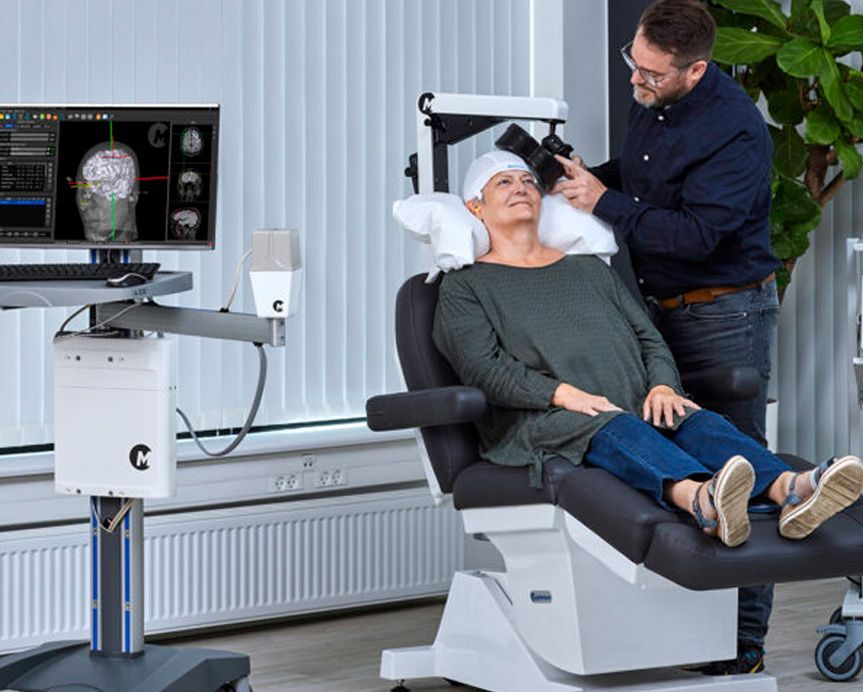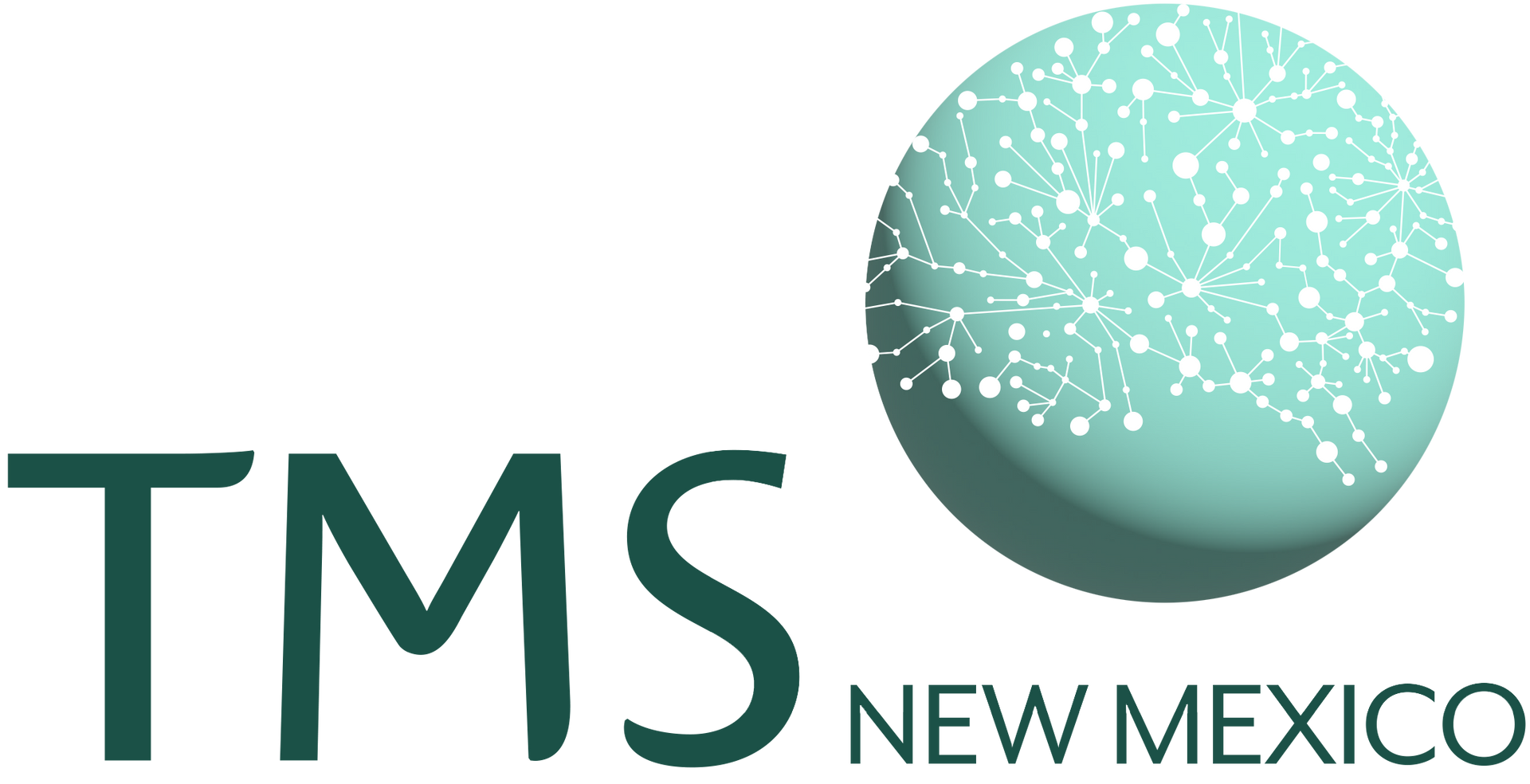300 Paseo De Peralta Suite 208, Santa Fe, NM 87501
Reclaim Your Life: The Potential of TMS Therapy for PTSD
Welcome to TMS New Mexico! We're on a mission to revolutionize mental health treatments and enhance the lives of our patients.
With PTSD Awareness Day coming up on June 27th, let's dive into an essential topic. Discover how Transcranial Magnetic Stimulation (TMS) therapy not only makes a big difference for those battling depression but also holds great promise in treating Post-Traumatic Stress Disorder (PTSD).
Join us on this journey to better mental health.
Understanding Transcranial Magnetic Stimulation Therapy
Transcranial Magnetic Stimulation (TMS) is a breakthrough, non-invasive treatment approved by the FDA. It’s especially beneficial for those battling major depressive disorder and major depression who haven’t found success with traditional therapies like medication management and psychotherapy to relieve symptoms.
At TMS New Mexico, we harness the power of advanced MagVenture TMS technology to treat depression. By using magnetic fields to stimulate brain nerve cells, we can help improve mood regulation and alleviate depression symptoms.
How Does TMS Work?
TMS therapy involves placing a magnetic coil near the patient's scalp to send quick magnetic pulses to specific brain areas. These pulses target the prefrontal cortex, a region linked to mood regulation. By stimulating this area, TMS can modulate neuron activity, improving mood and reducing depressive symptoms over time.
Typically conducted over several weeks, each TMS session lasts about 20 to 40 minutes. One of the standout benefits of TMS therapy is its non-invasive nature and minimal side effects compared to traditional antidepressant medications.

TMS Therapy for Major Depressive Disorder
Depression is a crippling mental health condition impacting millions globally. TMS therapy can be particularly beneficial for those suffering from severe depression and moderate depression. It often shows up as persistent sadness, loss of interest in activities, changes in appetite and sleep, and trouble concentrating. For many, the journey to finding effective treatment is tough. Interpersonal therapy, along with cognitive behavioral therapy and psychodynamic therapy, is a common method used in depression treatment. TMS offers hope for those with severe depression who have not found relief through other treatments.
Examining Common Depression Symptoms
- Persistent sad, anxious, or "empty" mood: This is the most common symptom of depression. People with depression may feel sad or down most of the day, or they may feel like they are going through the motions of life without feeling any joy.
- Feelings of hopelessness or pessimism: People with depression may feel like things will never get better, and that there is no point in trying.
- Loss of interest or pleasure in hobbies and activities: Things that used to bring a person enjoyment no longer do. This can include hobbies, social activities, sex, and even food.
- Fatigue, lack of energy, or feeling slowed down: People with depression may feel tired all the time, even after getting a good night's sleep. They may also feel like they are moving in slow motion.
- Difficulty concentrating, remembering, or making decisions: Depression can make it hard to focus on tasks, remember things, and make decisions.
- Difficulty sleeping, waking too early in the morning, or oversleeping: People with depression may have trouble falling asleep at night, or they may wake up too early in the morning and not be able to fall back asleep. They may also sleep too much.
- Changes in appetite or unplanned weight changes: People with depression may lose their appetite and lose weight, or they may overeat and gain weight.
- Restlessness or irritability: People with depression may feel restless and on edge, or they may be easily annoyed or angered.
- Feelings of worthlessness or guilt: People with depression may feel like they are worthless or that they are to blame for everything that goes wrong in their life.
- Suicidal thoughts or attempts: If you are having thoughts of suicide, please seek help immediately. You can call the National Suicide Prevention Lifeline at 1-800-273-8255 or go to https://988lifeline.org.
It's important to note that not everyone who experiences some of these symptoms has depression. However, if you are experiencing five or more of these symptoms for two weeks or more, it is important to see a doctor or mental health professional to get a diagnosis and treatment plan.
TMS Therapy for Post Traumatic Stress Disorder
Post-Traumatic Stress Disorder (PTSD) is a serious anxiety condition that can arise after experiencing or witnessing a traumatic event. PTSD is often accompanied by anxiety symptoms and mood disorders. Imagine confronting flashbacks, haunting nightmares, severe anxiety, and uncontrollable thoughts about what happened. PTSD can deeply disrupt a person’s ability to navigate everyday life, making each day a challenge, and it is often linked to mood disorders. TMS therapy can help relieve symptoms of PTSD, similar to its effects on depression.
The Potential of TMS for PTSD
While TMS is mostly known for treating depression, exciting new research shows it can also help relieve PTSD symptoms and possibly treat PTSD. Discover how TMS can make a difference:
- Calming Hyperarousal: PTSD often traps the brain in a constant state of heightened alertness. Through TMS, brain activity can be modulated, soothing this hyperarousal and alleviating symptoms like insomnia and hypervigilance.
- Boosting Cognitive Processing: TMS has the power to enhance cognitive functions, often impaired in those with PTSD. This means better emotional regulation and a greater ability to process traumatic memories.
- Drug-Free Relief: For those wary of medications due to side effects or personal preferences, TMS offers a non-pharmacological alternative that can be just as effective in managing symptoms.
- Promising Research:
Encouraging studies highlight the potential of TMS in treating PTSD. The findings show significant reductions in symptoms, offering new hope for sufferers.
The TMS New Mexico Experience
At TMS New Mexico, we are dedicated to delivering personalized care that caters to the unique needs of each patient. Here’s what sets our approach apart:
- Comprehensive Assessment: Before beginning TMS therapy, a mental health professional conducts a thorough assessment of each patient’s medical history, current symptoms, and treatment aspirations. This helps us craft the most effective and individualized treatment plan.
- Advanced Technology: We utilize MagVenture TMS technology, celebrated for its precision and efficacy. Our state-of-the-art equipment ensures that our patients receive top-tier care every step of the way.
- Holistic Support: Beyond TMS therapy, we offer EEG and neurofeedback services, along with holistic health consultations. This integrative approach allows us to tackle all areas of mental health, creating overall well-being.
- Ongoing Monitoring: We accompany our patients throughout their treatment journey, closely tracking progress and making necessary adjustments. This ensures optimal outcomes and continuous support, keeping our patients on the path to success.
Conclusion: A Hopeful Future with TMS Therapy
With PTSD Awareness Day on the horizon, it's vital to spotlight the transformative power of innovative treatments like TMS therapy on mental health. If you're battling depression or PTSD, TMS could be your breakthrough to recovery.
At TMS New Mexico, we're passionate about guiding our patients to relief and enhancing their quality of life with advanced, compassionate care.
If you or someone you know is interested in learning more about TMS therapy, we encourage you to visit our mental health clinic in Santa Fe New Mexico or contact us for more information. Together, we can work towards a brighter, healthier future.

HELPFUL LINKS TO LEARN MORE
Book an appointment at our mental health clinic in Santa Fe, New Mexico. You are not alone!

READY TO GET STARTED?
At TMS New Mexico of Santa Fe, we specialize in advanced neurocare and psychiatric services aimed at improving mental health for residents of Santa Fe County and Los Alamos County. Our tailored treatment plans are designed to specifically target depression, empowering our clients to lead more fulfilling lives. If you or a loved one struggles with depression, anxiety, OCD, PTSD, or another mental health issue, we may be able to help.
SERVICE AREAS
- SANTA FE
- CAÑONCITO
- SETON VILLAGE
- GALISTEO
- GLORIETTA
- LA CLENEGA
- LOS CERRILLOS
- MADRID
- TESUQUE
- CHUPADERO
- POJOAQUE
- LOS ALMOS
- WHITE ROCK
- NAMBE
- PECOS
- SANTA FE
- CAÑONCITO
- SETON VILLAGE
- GALISTEO
- GLORIETTA
- LA CLENEGA
- LOS CERRILLOS
- MADRID
- TESUQUE
- CHUPADERO
- POJOAQUE
- LOS ALAMOS
- WHITE ROCK
- NAMBE
- PECOS
- TAOS
MAIN LINKS
CONTACT
300 Paseo De Peralta Suite 208, Santa Fe, NM 87501
- Mon - Fri
- -
- Sat - Sun
- Closed
COMPANY
NPI# 1811753767

All Rights Reserved | TMS New Mexico


